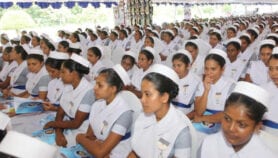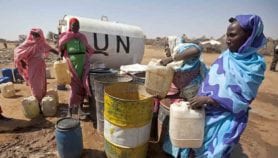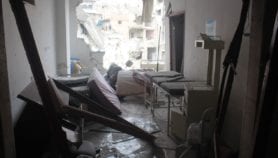Send to a friend
The details you provide on this page will not be used to send unsolicited email, and will not be sold to a 3rd party. See privacy policy.
The discontent behind recent protests in Egypt carries lessons for how both science and journalism are handled across the Arab world.
For most Egyptians protesting vociferously — and ultimately successfully — in Cairo’s Tahrir Square and elsewhere over the past two weeks, the state of the nation’s science will have been far from the top of their complaints.
Nevertheless, researchers are reported to have been prominent among the protesters. This shows that their professional frustrations with the policies of their government towards science and technology (S&T) resonate with the passionate concerns of many other Egyptians about how their country is being run.
Frustrations among scientists in Egypt have been bubbling below the surface for many years. Some have focused on the lack of adequate support for high-class research in the country, where low academic salaries have forced many scientists to either dilute their energies by taking second jobs, or to join the brain drain.
Other pressures have broader implications. The failure to establish strong links between university research and private industry, for example, has created a culture where technological innovation is unable to flourish. This is widely regarded as one reason for the shortage of jobs for young people — including qualified graduates.
Anger at the high level of youth unemployment has certainly fuelled the current wave of protests. And behind all this has been continuing dismay at the crippling effect of a powerful — and at times corrupt — government bureaucracy that deflects time, energy and resources away from productive activities.
Not just Egypt
Last year, the UN Education and Scientific Organisation (UNESCO) released a report, ‘UNESCO Science Yearbook 2010‘, which pointed out that such problems are not unique to Egypt, but are shared by many countries in the Arab world.
The report lists a number of recent initiatives in the region aiming to boost high-quality research and promote public–private partnerships for research and development, from the new King Abdullah University of Science and Technology (KAUST) in Saudi Arabia, to the creation of S&T parks in many states.
But it also points out that "in Arab countries, the indifference shown by decision-makers to S&T is a major contributor to the current vegetative state of S&T". And it criticises the role of governments in exerting "undue influence over universities, mainly out of political considerations".
It is difficult to disagree with the report’s conclusion that these and other deep-rooted issues need to be tackled urgently if Arab countries are to create vibrant knowledge-based economies that meet the needs of their citizens.
Opportunities for change
The strength of the demonstrations over the past two weeks has dramatically illustrated how deeply many Egyptians desire to see their government tackle the obstacles that stand in the way of accelerating the country’s social and economic progress and achieving this goal.
How these broader issues will be resolved — hopefully peacefully — now the President Mubarak has left the scene remains to be seen. But whatever the outcome, there will be several opportunities in the months ahead to reflect on ways of implementing the policy changes urgently required for science to contribute to progress more effectively.
For example, an ambitious Arab Science and Technology Plan of Action (ASTPA) drawn up by experts from across the region will be submitted for adoption at a summit meeting of Arab states scheduled for next month in Baghdad, Iraq.
The plan identifies a number of priority areas for research. It is also likely to propose an "online Arab S&T observatory" to monitor its implementation in Arab states, highlighting areas where countries may or may not be living up to their commitments.
It is vital that monitoring is not restricted to direct factors, such as the level of support for university research, but includes the broader political environment that allows science to flourish — and the obstacles that prevent it from doing so (as has been the case in Egypt).
The current events in Cairo underline the fact that the contribution of science to development can only be filled if the political environment is sufficiently supportive. Science cannot flourish, nor can its benefits be widely shared, in any overly-restrictive, bureaucratic state.
Allowing journalistic freedom
Three months from now, Egypt is due to host a separate but no less relevant event, the 7th World Conference of Science Journalists, which, at the time of publishing this editorial, is still planned to take place in Cairo.
This meeting will highlight the vital function that journalists play in communicating to both policymakers and the public the message that S&T have an important role to play in promoting development.
Inevitably, the conference will also be an opportunity to reflect on the need to respect the freedom of journalists to report on responses to this message, and on cases where their efforts to communicate openly have been restricted. The harassment of journalists — both national and foreign — is amongst one of the ugliest aspects of the recent events.
Scientists and journalists have a common interest in fighting to improve the conditions, both material and political, under which they operate. They must do so not only in their own interests, but also in those of the society that benefits from their work. In Tahrir Square they have been sharing their concerns, often with bloody consequences. Hopefully it will not have been in vain.
David Dickson
Director, SciDev.Net













